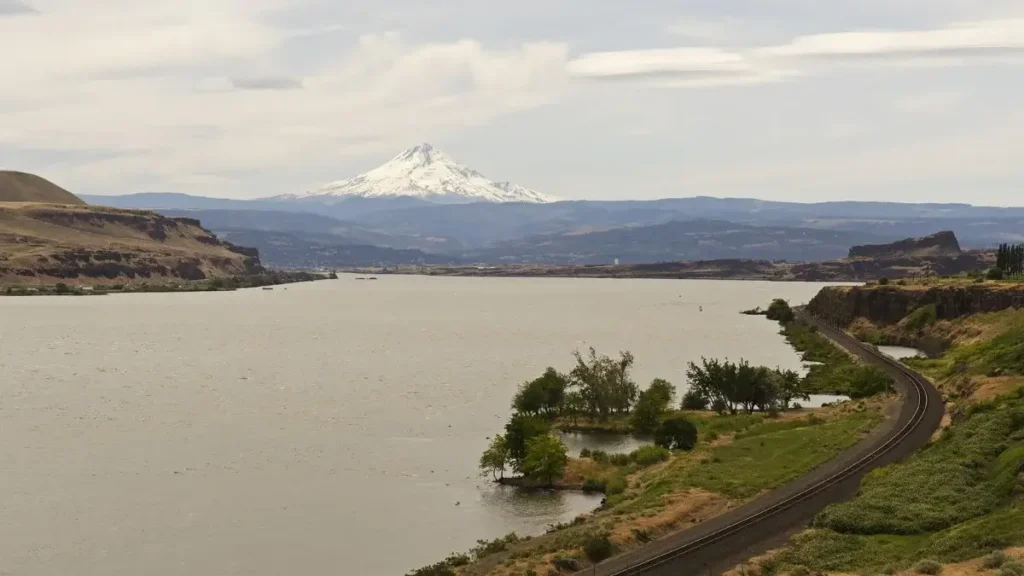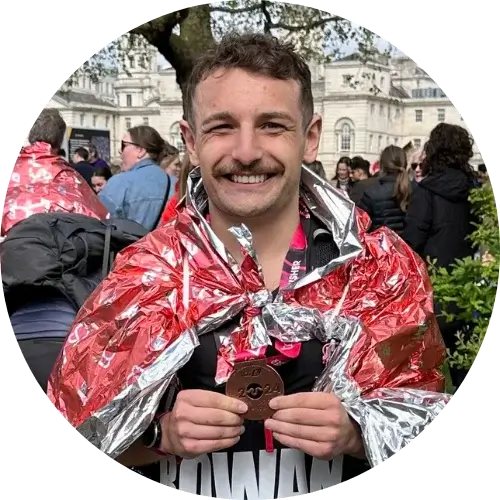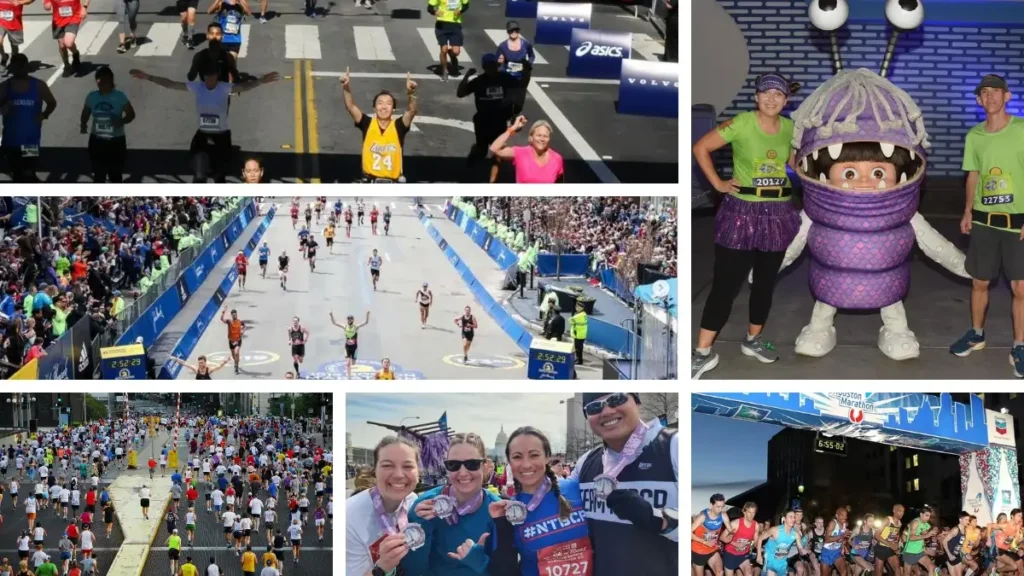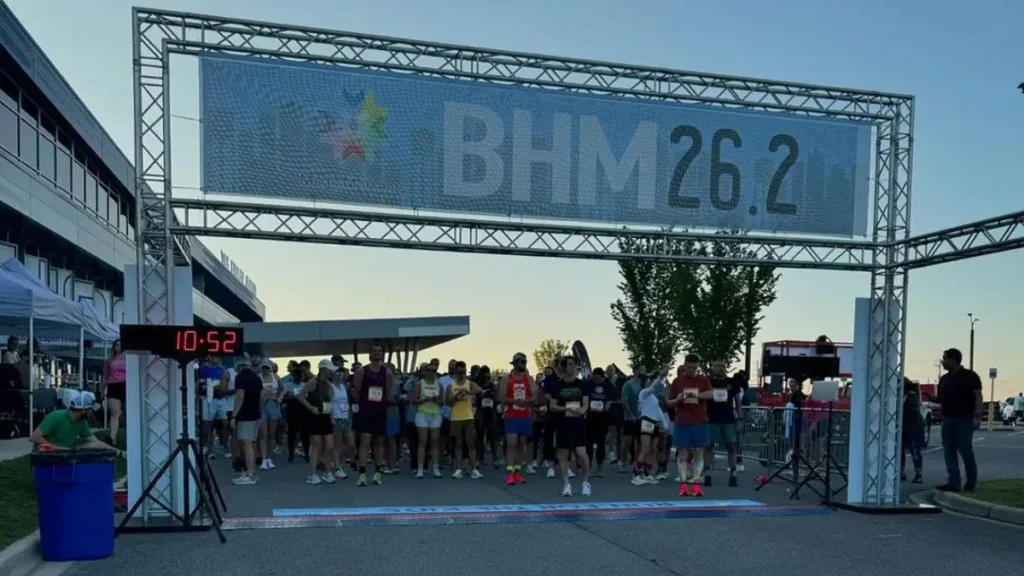From Eugene to Portland to Hood River to Harrisburg, and more.
Running a marathon in Oregon means committing to two things: scenery and unpredictability.
The views will be there: ridgelines and trees doing their whole fall thing, but so will the elevation, the fog, and that stubborn Pacific Northwest chill.
These aren’t polished, big-city productions. They’re smaller, quieter, and often harder than you expect, in ways that don’t always show up in the elevation chart.
Some of these races hug highways, others snake along river trails or climb into forest. What they all share is a sense that you’re running through Oregon, not just around it.
Looking for a different state?
What are the Best Marathons in Oregon?
Eugene Marathon
Eugene | Apr 26, 2026
Course Type: Mostly Flat
Elevation Gain: 3,791 Finishers
Participants: 496 feet (151m)
Price: $150-$190
There’s something grounded and unfussy about the Eugene Marathon. It starts just outside Hayward Field and ends with a lap inside it—arguably one of the most iconic finishes in the U.S. You’re literally running into history, past the same spot Steve Prefontaine used to train. But the course itself doesn’t lean too hard on nostalgia. It winds through quiet neighborhoods, stretches south along E Amazon, and eventually ducks into the Ruth Bascom Riverbank Path System. The second half flattens out, trading roads for riverside paths and a calm stretch through Alton Baker Park.
This isn’t a race that overwhelms. The logistics are clean. Packet pickup is quick. Gear check is easy. You could show up 30 minutes before the start and not feel rushed. There’s a 7-hour course limit, plenty of porta-potties (even some flushable ones in the stadium), and the crowd size feels manageable. The weather in late April usually cooperates – think low 40s at the start, overcast skies, and maybe a bit of light mist. Honestly, perfect running conditions.
The course isn’t flat, but it’s not hard either. There’s one real climb around mile 9 and a few rollers in the early miles, but nothing that throws off your rhythm too much. Pacing evenly works here. Once the marathon splits from the half, the course quiets down. Fewer spectators. Fewer distractions. But there’s a calmness in that stretch, a steady river to your side, the feel of soft trail beneath your feet. The finish on the Hayward Field track is exactly what it should be: loud, clear, and a little emotional.
The details are well thought out. A reusable water bottle, a pancake breakfast, local beer, and a medal made from wood salvaged from the old grandstand. It’s the kind of race that gets the small stuff right without making a big deal about it.
Portland Marathon
Portland | Oct 5, 2025


Course Type: Rolling Hills
Elevation Gain: 873 feet (266m)
Participants: 2,562 Finishers
Price: $149-$179
The Portland Marathon doesn’t really ease you in. The first couple miles are a climb, not steep, but steady enough to make you second-guess your pacing plan if you’re not paying attention. But then the course opens up. You cross bridges, hit long straightaways through downtown, and loop out into some surprisingly quiet neighborhoods before coming back toward the river. It’s not flat, but it’s forgiving. Around 480 feet of gain, most of it gentle.
This is a city marathon with just enough grit to feel real. There’s music on the course, some good, some weird—and the crowd support ranges from full-on cheering squads to lone baristas clapping outside cafes. One stretch takes you through industrial zones, which honestly feels like a lull. But then you’re back over the Broadway Bridge with the skyline in view, and there’s momentum again. The final miles hug the river on Naito Parkway, flat and straightforward, with a finish line that feels earned more than celebrated.
Weather can go either way. Some years it rains. Some years it’s clear and cool. Either way, October in Portland is unpredictable enough that you check the forecast daily the week before. But even if it’s wet, the city feels built for that. And so does the race. Nothing flashy, just a solid urban marathon with a little edge and a lot of personality tucked between the bridges.
Columbia Gorge Marathon
Hood River | Oct 19, 2025


Course Type: Very Hilly
Elevation Gain: 1869 feet (569m)
Participants: 278 Finishers
Price: $129-$209
There’s a kind of quiet stubbornness required to run the Columbia Gorge Marathon. Not because the course is cruel (though, yeah, mile 19 begs to differ), but because it asks you to stay present. It’s all paved, but don’t let that fool you – this isn’t your average road marathon. With nearly 1,900 feet of elevation gain and long stretches of steady incline, you can’t coast. You have to run the course you’re given, and the course here is as moody and beautiful as October in Oregon.
The views? Pretty much undeniable. This is fall foliage at full volume. You’re running above the Columbia River, on a mix of old highway-turned-pedestrian-trail and backroads, with huge panoramic views that’ll make you pause even if your legs beg you not to. But that scenery comes with a price: the climbs are real, especially between miles 18 and 21, where the incline hangs around 5% and seems to stretch forever. There’s a generous cutoff time – 3:30 p.m.—so the pressure’s off, but the terrain doesn’t let you zone out.
This race feels small but personal. Aid stations every 1.5 miles. Port-a-potties spaced thoughtfully (Start, Stations 1, 3, 4, and Finish). You’ll likely see the same volunteers more than once, and there’s something comforting about that. The last few miles mix in with half marathoners, which gets a little congested, but also helps carry you in. You finish on a downhill, which feels like a gift.
Logistics are low-stress. Gear check is simple and efficient, with bib tear-offs used to match bags at the finish. Parking is easy, and shuttles take runners to the uphill start. If you take the early start at 8 a.m., you’ll get a head start on the views—and avoid feeling rushed late in the day. Just don’t expect a big crowd at the finish line if you’re coming in close to cutoff; the post-race party (taco bar, homemade soup, local fruit) starts winding down early.
Pacific Northwest Marathon
Harrisburg | Sep 20, 2025
Course Type: Very Flat
Elevation Gain: 127 feet (38m)
Participants: 56 Finishers
Price: $125
This one doesn’t ease you in. There’s climbing early, a long stretch between miles 18 and 21 that wears you down, and rolling hills throughout. Nearly 1,900 feet of elevation gain, all on paved road and trail, with a few stretches exposed to traffic. But the payoff is in the views – massive river vistas, bursts of fall color, and quiet stretches through old-growth forest.
The course follows the Historic Columbia River Highway, a patchwork of scenic byway and remote trail. Some parts feel wild and untouched. Others take you past grassy fields and open road, less dramatic but still part of the story. You get aid stations every 1.5 miles, port-a-potties where you need them, and an honest sense that the logistics are handled without fuss.
It’s a small race and that’s a good thing here. The early start option helps space things out, and there’s room to run without weaving or crowding. Just don’t count on spectators deep into the course. The last few miles overlap with the half, so things pick up again near the end, finishing with a long, gradual downhill.
What stands out is how straightforward it all feels. You park. You ride a shuttle 2.5 miles uphill. You run. You finish. There’s a taco bar, some soup, and local fruit waiting. The swag includes a ¼ zip and a beanie, not a flashy medal, and that feels about right. No frills, no flash – just a tough, beautiful race that delivers exactly what it promises.
The Solitude of Oregon Marathons
There’s a rhythm to Oregon marathons that has nothing to do with pacers or playlists. It’s quiet out there. Not silent—but definitely low on cheering squads, DJ booths, or inflatable tunnels. Whether you’re on the tree-lined banks of the Columbia River, the residential loops of Eugene, or the industrial zones outside Portland, chances are you’ll be running without much noise.
None of these races crack the 10,000-runner mark. Most are well under 1,000 for the full distance. Pacific Northwest and Columbia Gorge often see fewer than 300 marathoners, which means miles can go by with just a few footsteps in earshot. Even Portland, the largest of the four, has its lulls, especially in the middle miles.
For some, that’s the charm. The scenery takes over. The pace becomes internal. If you’re someone who prefers nature to noise, or you just like the idea of space (mental and physical) these races give you that. It’s not lonely. But it’s definitely not loud.
What to Expect from the Weather
Fall races in Oregon are a gamble and that’s part of the deal. You could wake up to 45 degrees and crisp, dry air, or you could be jogging to the start line under steady drizzle. Most of these marathons take place in October, which means you’re right in the overlap of perfect running weather and the early edge of rainy season.
Columbia Gorge often delivers stunning skies, bright leaves, and mist hanging just above the river, but it’s also had years where runners spend hours dodging puddles. Temps tend to sit in the low 40s at the start, climbing into the 50s or 60s by mid-morning—comfortable if you’re moving, but chilly if you’re standing around at gear check or waiting for the shuttle.
Eugene and Portland lean more urban and a touch warmer, but they’re not immune to morning fog or sudden shifts. Layering is non-negotiable. Gloves you can ditch by mile 3. A light jacket that won’t trap sweat. A hat or beanie you’ll thank yourself for having when the wind picks up along the river.
It’s not about dressing for the worst. It’s about staying ready for anything. Oregon skies are changeable. The races are rain-or-shine. And if you’re lucky, that first sunbeam breaking through the clouds mid-course might just be the best part of your day.
Concluesion
Oregon doesn’t go out of its way to impress you. Its marathons don’t promise perfect crowds or perfect splits. But if you’re into a race that feels a little more personal and a little less produced, there’s real beauty here, sometimes brutal, often quiet, always present. These courses don’t just test your fitness. They ask for patience, attention, and maybe a little awe. You won’t always get the race you expect, but you’ll remember the one you got.

Row Brown is the founder of Refresh Row. He is a keen marathon runner, his favorite being the London Marathon. He’s now set himself the mission of Running the Entire Length of Spain, which is scheduled for late 2024.



